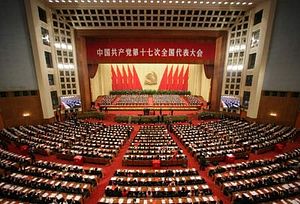The Chinese Communist Party (CCP)’s 19th National Congress, one of the most important meetings in China’s political calendar, has been set to begin on October 18. Exactly one month before the congress begins, the CCP announced that it will revise the party constitution to include “the key theories and strategic thoughts” at the October congress.
On September 18, Chinese President Xi Jinping, who also serves as general secretary of the CCP Central Committee, presided over a meeting of the Central Committee’s Political Bureau, deliberating a draft amendment to the Party’s constitution.
The new amendments will include “the key theories and strategic thoughts” so as to “fully represent the latest sinicization of Marxism,” according to a Party’s statement issued after the meeting and published by Xinhua.
The meeting also emphasized Xi’s significant contributions since assuming office in 2012, noting that the party, with “Comrade Xi Jinping as the core” has taken on “problems and malpractices within the Party.” This would seem to be a reference to Xi’s crackdown on corrupt officials — “tigers” and “flies”alike. The statement attributed this success to Xi’s “tenacious will.”
Although the statement didn’t clarify what “key theories and strategic thoughts” exactly would be included in the party constitution, it is widely believed that these will be the thoughts of Xi, as only Xi’s political thoughts have been addressed as “key theories and strategic thoughts” by Chinese authorities in the last five years.
In fact, the real question is whether Xi’s name will be included in the amendments, since only the names of Mao Zedong and Deng Xiaoping, together with the names of Marx and Lenin, have been attached to their political philosophy in the CCP’s constitution so far.
Neither of Xi’s predecessors, Jiang Zemin nor Hu Jintao, had added their names directly. However, Jiang had his thoughts — the “Three Represents” — and Hu had his theory — of “scientific development” — written into the constitution.
Another significant question is whether the revised constitution will restore the position of “Chairman of the Central Committee.”
Mao Zedong held the position of “chairman,” who was the paramount leader of the CCP. After the Cultural Revolution, in 1982, to get rid of absolute power, the CCP removed the position of “chairman” and replaced it with “general secretary,” which is the position Xi holds now.
While a “chairman” was supposed to have supreme leadership over the whole party, the “general secretary” is theoretically equal to other members in the Politburo Standing Committee (PSC), the highest and smallest organ that controls the country. The most recent party constitution says “the General Secretary is responsible for convening meetings of the Central Political Bureau and the PSC, and presiding over the work of the Central Secretariat.”
Since assuming office, Xi has consolidated power. Numerous high government officials had to vow their loyalty to “the Party Central Committee with Comrade Xi Jinping as the core.”
The most relevant indicator is that in the most recent two military parades — one to commemorate the Hong Kong’s handover and the other to commemorate China’s Army Day — the troops were instructed to address Xi as “chairman” rather than the traditional “leader.”
Xi also holds the position of chairman of the Central Military Commission, but the slight and rather unprecedented change of protocol still may have been an important stage cue in China’s unfolding political theater.

































